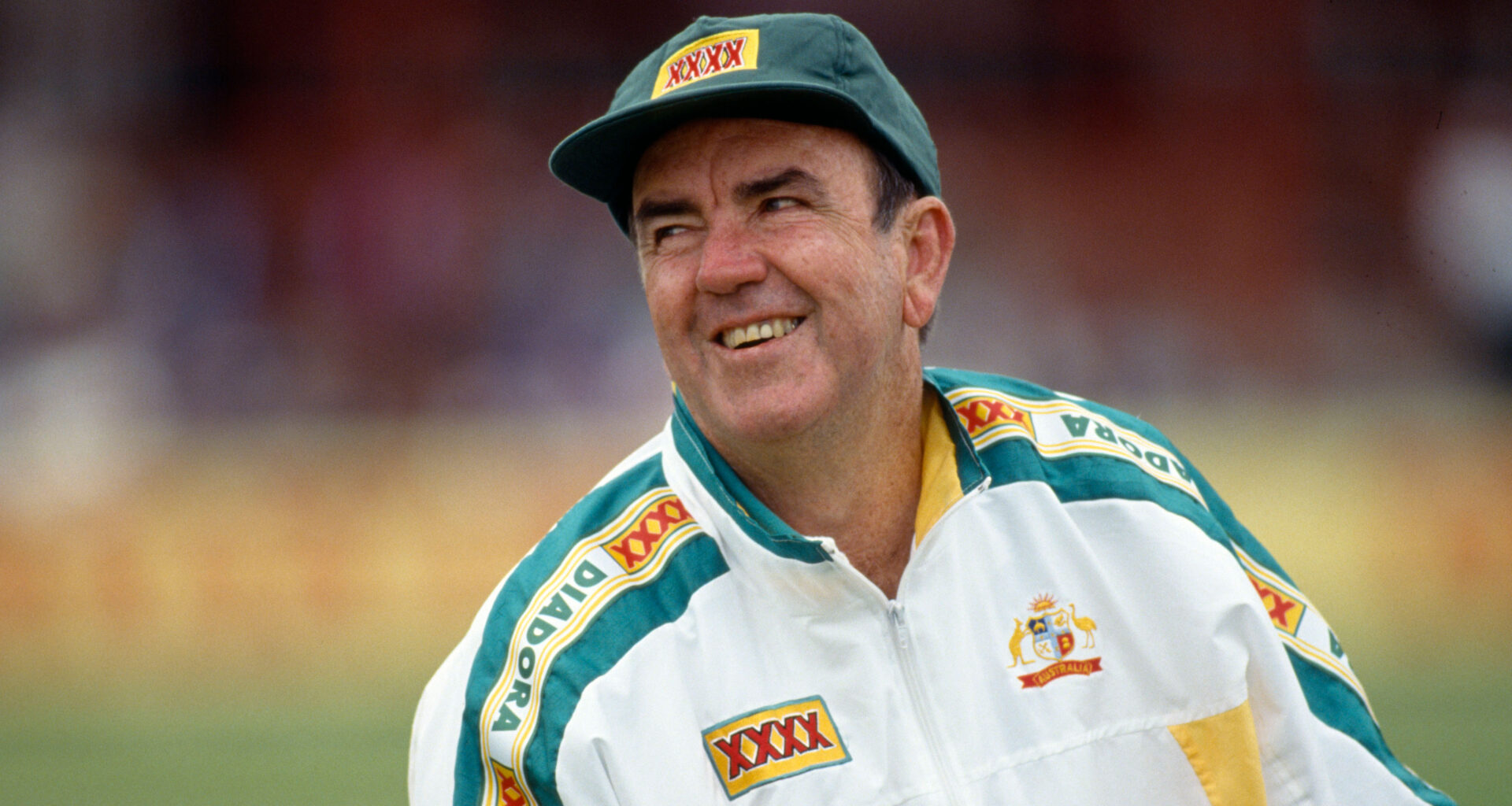An iconic figure as player, captain and coach, Bob Simpson has left a lasting legacy on Australian cricket history
Bob Simpson, the former Test captain and coach credited for birthing Australia’s modern-day golden era, has died aged 89 in Sydney.
A pivotal figure in the dressing room during Australia’s rise to the peak of world cricket throughout the 1990s, Simpson’s legacy lasted long after he stepped away from the head coach role in 1996.
A leg-spinning allrounder turned gritty opening batter and an excellent slips fielder, Simpson played 62 Tests for Australia between 1957 and 1978, scoring 4,869 runs, having made his debut on a tour of South Africa in 1957.
His first of 10 Test centuries didn’t come until his 30th Test, but he made it count, hitting a career-high 311 against England at Old Trafford in 1964 in a record-setting year. It was a pivotal innings, lasting 13 hours, that ensured Australia would retain the Ashes.
His opening partnerships with Bill Lawry set a world record for the time as the pair averaged more than 60 for the first wicket, putting on 3596 runs together in 62 Test innings.
During World Series Cricket, Simpson came out of retirement to again captain Australia in 1977-78, aged 41, adding two more centuries against India and leading the team on a Caribbean tour.
In all, he captained 39 Tests, initially taking over from Richie Benaud and leading the team for the first time at the MCG on New Year’s Day, 1964, against South Africa.
Simpson and Gary Cosier (right) inspect Queen’s Park Oval pitch in Trinidad, 1978 // Getty
Simpson became the first full-time head coach of the Australian side in 1986, inheriting a side captained by Allan Border that was at a low ebb, in the middle of a winless run that stretched out to three years.
Simpson and Border instilled a hard edge on a promising crop of new players including the likes of Steve Waugh, David Boon, Dean Jones and Craig McDermott, and the coach’s insistence on discipline at training, batting technique and improving effort in the field helped turn Australia into the sharpest unit in the game.
“Bob was very adamant about getting everyone on the same page, as far as attitude was concerned,” Border wrote in 2019. “He’d sometimes say, ‘Up to midnight is your time. After midnight is cricket’s time’. Without having actual curfews, he’d lay down the law.
“If you’d been out late you really copped it at training. It wasn’t a verbal thing, it was more that he’d hammer you with fielding drills until you fell over half-dead. He just knew if you’d been out late.”
Border would admit “Bob’s not everyone’s cup of tea, but he was very good for our team” and credited him with introducing a structure and tactics to the Australian one-day side that had previously been missing.
It saw them shock the world by winning the 1987 World Cup as rank outsiders.
Bob Simpson and Allan Border toast the 1987 World Cup win // Getty
“We were a young group and we’d lost our way. But Bob had a really strong work ethic with things like the fielding drills and, overall, the disciplines of practice,” Border wrote for AthletesVoice in 2019.
“He was sensational. He was definitely a factor in why we did well in ’87.”
Results in the Test arena would soon follow as Simpson’s influences took hold and the players bought in to his hard-nosed approach.
Australia arrived in England in 1989 branded “possibly one of the worst sides to ever tour England” by the local press. But with careful planning orchestrated by Simpson and executed by Border, the Australians won the six-Test series 4-0 to regain the Ashes. They would win the next eight Ashes series in a row.
Shane Warne (left) and Simpson talk tactics in 1993 // Getty
Simpson and Border had turned Australia into a force, going undefeated at home in 19 successive Tests, and while the 1992 World Cup at home was a nadir, the crowning glory for Simpson was the legendary 1995 tour of the West Indies where Australia finally overcame their feared foes to claim the mantle as the top team in the world.
“Bob Simpson was one of the greats of Australian cricket and this is a sad day for anyone fortunate to have watched him play or who benefited from his wisdom,” said Cricket Australia chair Mike Baird.
“As a brilliant opening batter, incredible slips fielder and handy spin bowler, Bob was a mainstay of a very strong Australian team in the 1960s, and he became a leader across the game as Australian and New South Wales captain and as a coach.
“Bob’s decision to come out of retirement to successfully lead the Australian team during the advent of World Series Cricket in 1977 was a wonderful service to the game, and his coaching set the foundation for a golden generation for Australian cricket.
“On behalf of Cricket Australia, I would like to express my warmest condolences to Bob’s family, friends, teammates and all those touched by his vast contribution to cricket.”
Simpson will be remembered with a minute’s silence at tonight’s third T20 against South Africa in Cairns, with players to wear black armbands.

